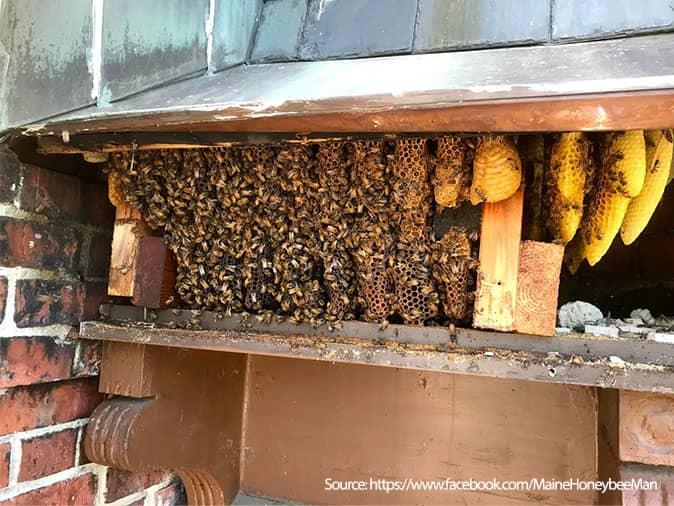September 26, 2022
Did you know that Aristotle was a beekeeper? Records indicate that at one point in his life he was in possession of a beehive and that he was so curious about it, he tried to build a window in it so that he could watch the inner workings. As you can well imagine he wasn’t successful in that particular endeavor but only because those hard-working honey bees made a covering for the opening with sticky resin. Good try, Aristotle! The point we’re trying to make is honey bees are fascinating creatures that we don’t always regard with the respect or admiration they deserve. That might be because they are capable of stinging and the stings they produce can pack a mighty painful wallop.

The Maine HoneyBee Man removed these honey bees from a the third story of a Westbrook, ME building
Honey bees are important
According to the United States Department of Agriculture, honey bees pollinate $15 billion worth crops each year, including more than 130 fruits and veggies. The hive products they produce, namely honey, pollen, royal jelly, beeswax, propolis, and venom are used by people for a variety of nutritional and medicinal purposes. They help sustain entire eco-systems by supporting the growth of plants, trees, and flowers which in turn, provide shelter and become food for all people and animals.
What would happen if we didn’t have honey bees
If honey bees disappeared for good, our diets would surely suffer, food costs would increase, and entire eco-systems would be altered. To put it simply, nothing good would come of a world without honey bees.
But honey bees are dangerous
If we’re going to put it all out there, a distinction must be made. Honey bees aren’t dangerous to everyone but they’re deadly to some.
A honey bee sting can hurt you without harming you long-term. The second their barbed stinger enters your skin you’re going to know it. The welt left behind will likely be uncomfortable if not downright painful for a while. That’s if you have a “normal” response.
For those who are allergic to honey bee stings, an event just described above can be potentially life-threatening. Thankfully and according to the Mayo Clinic, a small percentage of people who are stung by a bee quickly develop anaphylaxis. But still, we’d be remiss if we didn’t note the severity of the threat. Also, if you experience a severe allergic reaction to a bee sting, there’s a wicked good chance (25%-65%) you’ll experience anaphylaxis the next time you’re stung.
Signs of a severe allergic reaction to a honey bee sting include, but are not limited to:
- Hives, itching, and other skin reactions
- Trouble breathing
- Swelling of the throat and tongue
- Nausea, vomiting, or diarrhea
- A weak, rapid pulse
- Dizziness
- Fainting
One final point to make, honey bees are aggressive and may swarm if threatened which means, multiple stings. You’re picking up what we’re putting down, right?
What to do if you find honey bees on, near, or even inside your home
Based on the information above, you can probably imagine the best thing to do if you encounter honey bees on your property and they present a threat to the health and safety of your family, is remove yourself from their presence and call in the professionals.
Does Pine State remove honey bees in Maine?
Here at Pine State Pest Solutions, we are the one-stop solution for all pest problems and are ready to help you evict nuisance and potentially destructive pests with effective home pest control services in Auburn, Portland, and throughout our multi-county service area. That said, we go about treating honey bees a little differently than yellow jackets, wasps, and other stinging insects. In fact, because we understand just how important honey bees are, we do not remove or eliminate honey bee hives but rather call in an experienced honey bee keeper to assist when we find honey bee hives where they shouldn’t be.
Meet Keith Kettelhut AKA the Maine Honeybee Man
Keith Kettelhut, the Maine Honeybee Man, specializes in removing honey bees from where they aren’t wanted such as chimneys and wall voids. When he’s not removing hives from Maine properties, Keith is busy running on average 50 hives a year and helping others find queens and healthy honey bees (this is harder than you might think), helping ailing honey bee hives, and working with other hive owners to ensure they have the best information and resources to maintain healthy hives. He’s also happy to give advice when called upon.
If you're concerned about stinging insects on your property, contact Pine State Pest Solutions today!

 Subscribe
Subscribe